No matter what you age you find running – or running finds you – it’s never too late to start. All you need is a good pair of running shoes and the motivation to put one foot in front of the other. Before you know it, a runner is born.
As the number of women and girls in road races continue to increase, it is valuable to highlight and learn from those who are already on their running journey. Meet six women, all at different stages of life, who started running for various reasons and have been running the Marine Corps Marathon (MCM) for many years, even decades.
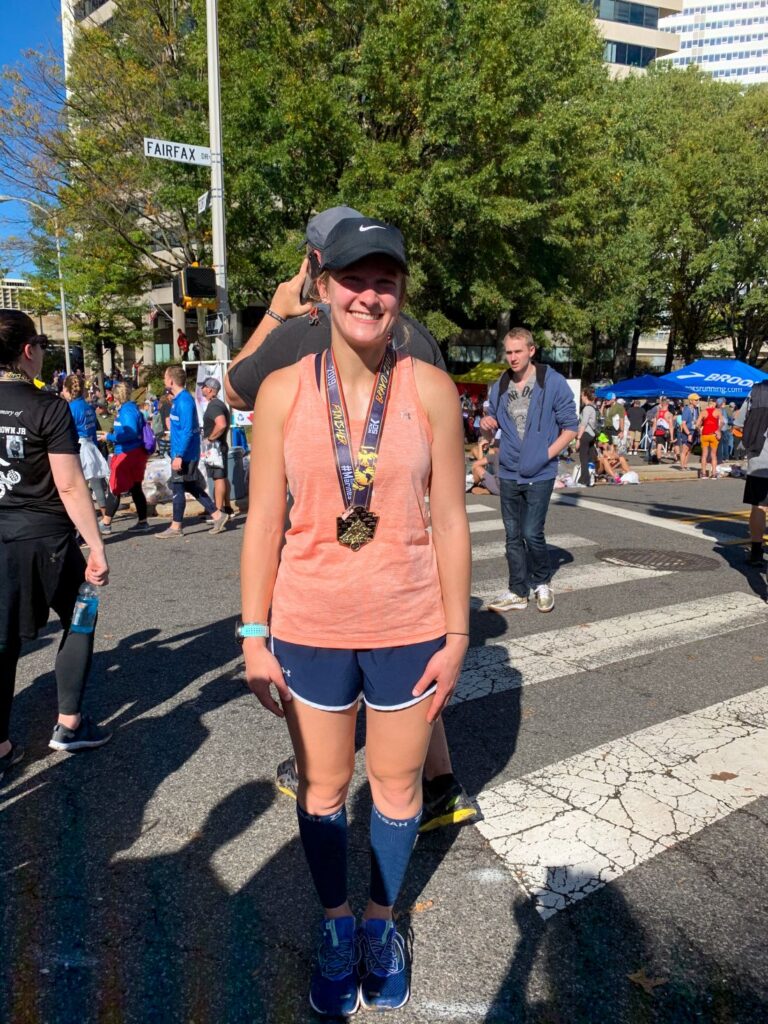
The 20s
Allison Durbin, 27
I started running in high school with my Dad, who was a Navy veteran and avid marathoner. I grew up with my sister Nicole crewing races for him from the Prague Marathon to MCM to the JFK 50 Miler and the Iron Man in Cambridge. He was so excited for us each to turn 16 so we could run our first MCM with him. We would run together after school and on weekends as a family. I ran my first MCM10K at 15, and my first MCM at 16. It was my dad’s idea for me to run 10 marathons before I turned 26 and I accomplished that goal in 2019, and in 2018 ran the inaugural MCM50K.
What does a #RunWithTheMarines mean to you?
It represents a decade of memories that fill the last week of October. My Dad and I ran five MCMs together before he passed away, and every single one since has been painful, but the Marines and support throughout the course help every mile.
Training advice for women in their 20s: Listen to your body and be kind to yourself, cross training works wonders, and after 20 or so miles, it’s all mental.
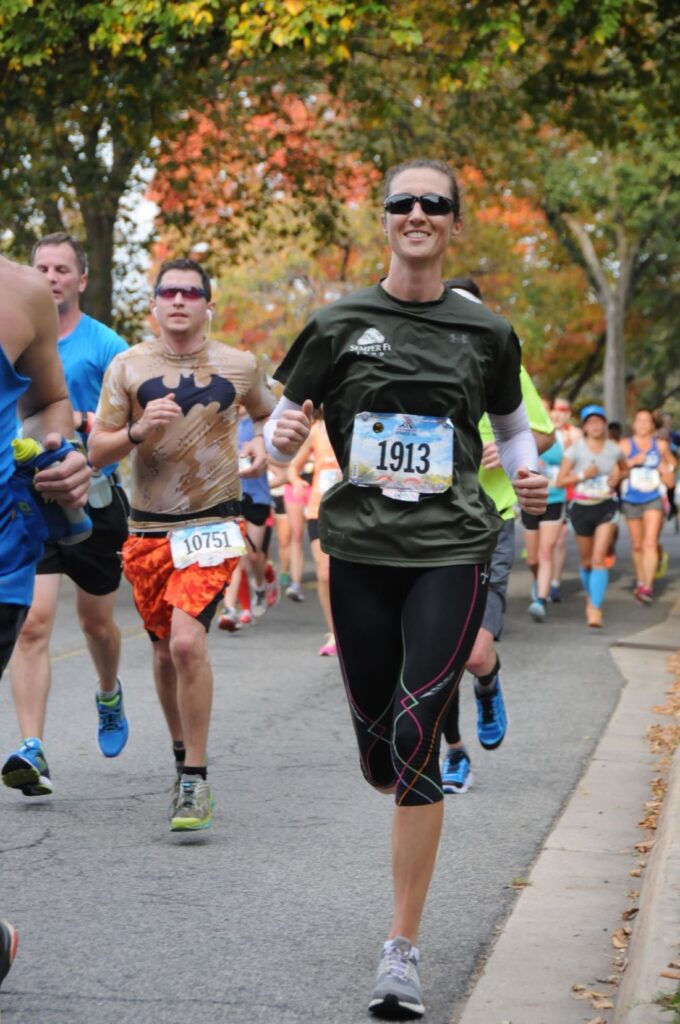
The 30s
Kathryn Dworak, 39
I’ve only recently started thinking of myself as a runner. While I’ve always enjoyed playing sports, I hated running. I would run for sports but couldn’t imagine running for the sake of running. Full on avoided it, in fact. I was 26 when I decided to join the Marines. And to be a Marine, you have to pass the Physical Fitness Test’s (PFT) three-mile run. So, I learned to run, first on a treadmill, then around the neighborhood. I still didn’t like it, but it became an important part of my routine. While waiting eight months to start flight school, I decided I was going to use the time to train to get a perfect score on the PFT. This essentially meant knocking a minute and half off my 5k. It took me nine more years of consistent running to reach that perfect 300. Instead, I evolved from running 5ks, to half marathons, to completing a marathon. A year later, I ran my first Marine Corps Marathon. And went back to run again the next year. And the next. And the next. I’ve ran every year for the last 10 years and I just signed up for the 2021 virtual MCM and 50K. Hopefully, there will be a live event this fall, and if there’s room for me, I’ll be there, laced up and ready to get some!
This marathon became more than just another race for me. It has become an annual tradition with friends gathering from various states (sometimes countries) for this one weekend a year. It is the only time I get to see certain sets of friends, when we gather to support each other.
What does a #RunWithTheMarines mean to you?
It’s a constant part of my life. It gives me something to look forward to every fall. Even though every year at Mile 24 I think, “This is dumb. Why am I doing this to myself?” Yet every year, I am enthusiastically back again. It is also a connection with other Marines. Who is debating on signing up and could use a nudge? Whose training is going well? Who can recommend a better 20 mile route on base? Whose unit is trying to get a team together? It is running for personal pride and accomplishment, it’s training in memory of those who can’t, and a celebration of doing it together. Being part of this community keeps me training, running, and looking forward to coming back every year.
Training advice for women in their 30s: I found that running through my 30s, deliberately incorporating cross training into my training plan is critical. It’s so easy to focus on miles and neglect strength. My best races have been when I’ve made time for both strength and spin/swimming. The repetitive stress injuries I’ve sustained have been when I prioritized miles over balanced training.
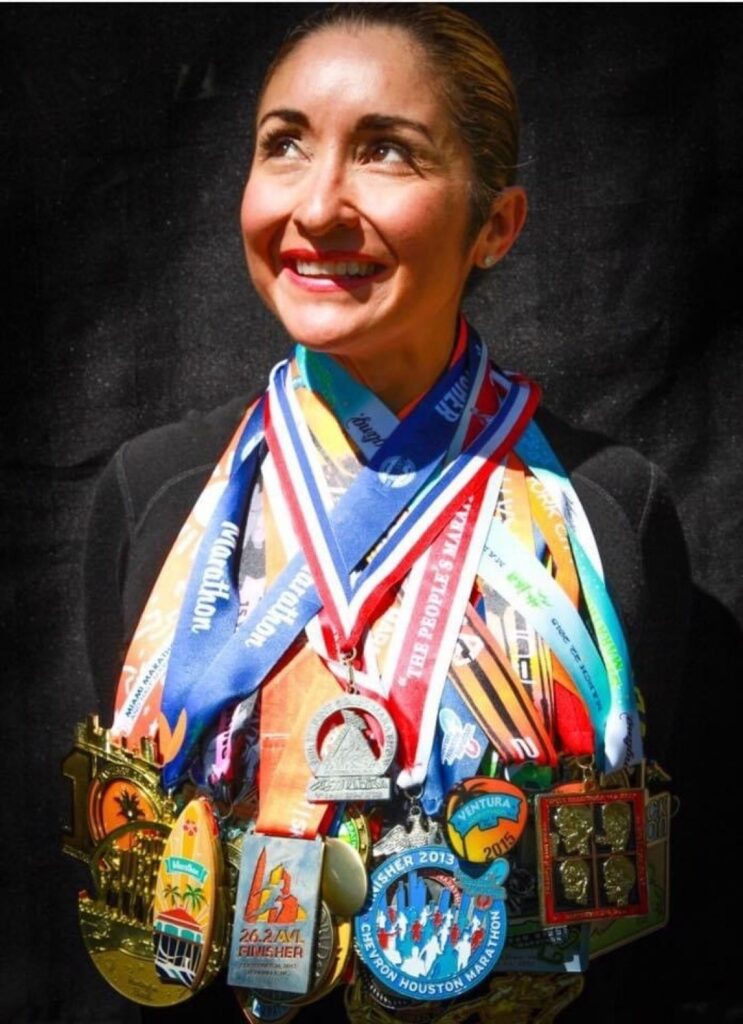
The 40s
Mona Sims, 45
I did not grow up running. I played team sports, but I was a B-team player, not really a competitor out on the field. When I married my Marine in my early 20s, I began running three miles. He and his fellow Marines would talk about running three miles, so I figured that would be a good start. I found a simple three-mile route aboard Camp Lejeune and I ran it several times a week. Over time, it became easier, but I never ran anywhere other than my three-mile route, until we moved to Monterey, CA. I ran that three-mile route so much that I was now fit enough to try other distances and terrains and I leaned into four- and five-mile runs.
Running in California was beautiful. I remember it being very challenging but worth the challenge. Then we moved to Washington D.C. and that is when I became an endurance runner. A few things happened that year. First, the move to D.C. allowed me to run longer and longer distances and I decided that I wanted to run a marathon. Why not the MCM? I am married to a Marine and I was now in the city where “The People’s Marathon” was held. Then, my husband deployed to Iraq, and I passed the worrisome time running and running. I participated in the 2004 MCM later that year in October – the first of 17 consecutive MCMs, and my first of 40 marathons. My husband was shot and wounded in the Battle for Fallujah the next month. He returned home, went through multiple surgeries, recovered completely and he continues to serve, but he also went back to combat over the next several years, so running was how I would get through each deployment. I kept thinking, “Just put one foot in front of the other; control what you can control.” Training schedules made weeks fly and before I knew it, we’ve moved more times than I can count on two hands; ran marathons and ultras all over the country; and convinced my siblings to run the MCM with me. Time passes and you just keep running.
What does a #RunWithTheMarines mean to you?
I literally get goosebumps when I think of that hashtag. I take it very seriously. I think of years of seeing Marines hump heavy-looking packs on early Saturday mornings as I am running a “long run” preparing for a marathon while they were preparing for war. I think of seeing Marines wearing green on green running incredibly fast as they complete their Physical Fitness Tests. This morning, I had a 10-mile run and I saw a fire team humping on the streets in Okinawa and I smiled because I have seen the “same” young men who do the same hard things over the years, and I am the same, just older and a little slower.
Training advice for women in their 40s: It’s the same advice that I would give anyone at any age: don’t compare yourself to anyone else. Your journey is your journey. It’s an insult to your personal journey when you compare it to others. Unless you are actually winning the races, it is you against you. Even if you are winning races, it really is still you against you.
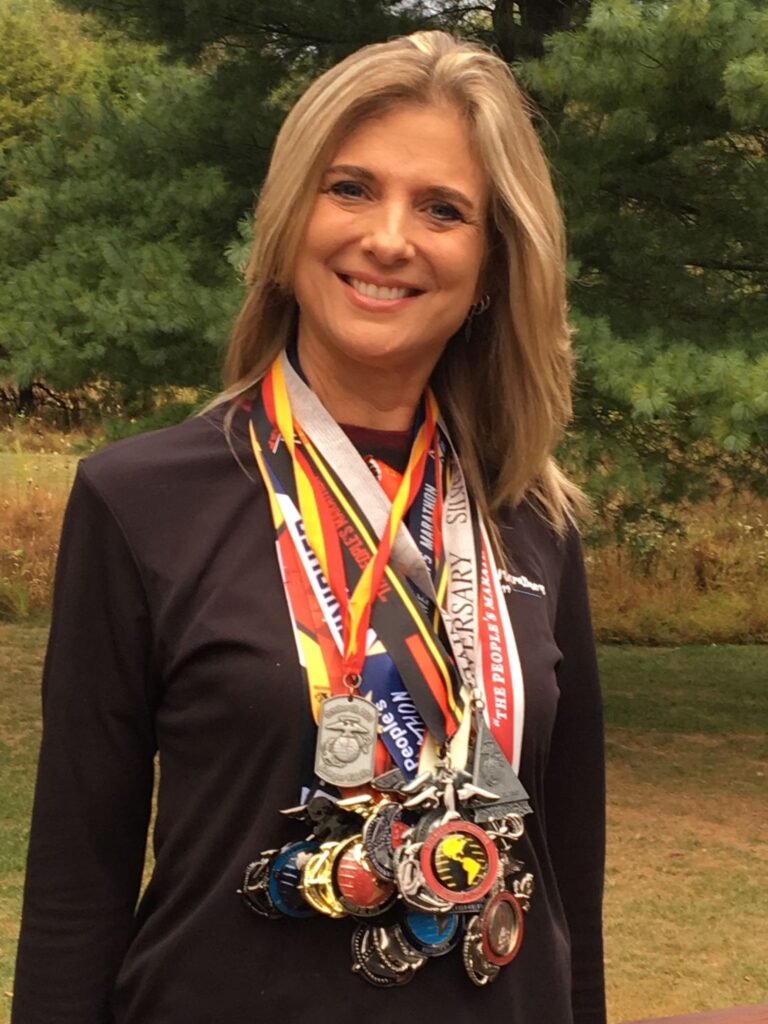
The 50s
Renee Brooks, 54
I ran everywhere as a child. People would ask if I was in a hurry, but I just liked running. I ran track in high school but struggled in high school to find my place in women’s sports. It was the early 1980s and I just didn’t know many women athletes. I got married early and had three children by the time I was 26 years old. I started “running” when I was 27.
When I was 27 years old (about 1993), my father told me he started walking around the high school track near his house. I was inspired by this. So, one day I tried running around the field behind the school where I taught. I made it four times around the field before collapsing. The next day, I ran around the field 5 times. I started running almost regularly, although I had three small children so it was challenging to find the time. Fast forward to 1995/1996, I was running every day and competing in local 5K races.
I played men’s basketball around this time and there was another player, Frank MacMillan, who was a runner. He was truly the only other runner that I knew of. It turns out he was an ultra-runner, so when I registered for my first Marine Corps Marathon in 1997, he volunteered to run with me. I believe it was his 10th MCM. I stood at the start line and felt like I was surrounded by men (whereas now there are as many women as men). Frank and I ran MCM together for the next 10 years (1997-2006). Marine Corps marathon was convenient to my home and my kids did not need to travel or stay with a sitter.
What does a #RunWithTheMarines mean to you?
I will be running my 25th consecutive MCM in 2021. I never intended to start a streak. In fact, my intention was to stop after 10 years and run other races. But I just couldn’t stop.
In 2009, I suffered a near-catastrophic spinal cord injury after getting hit by a drunk driver (in a car accident). I was determined to get better so that I could run Marine Corps later that year. It was a great motivator and that year was life-changing for me. It was the year I decided to keep my streak alive. In 2013 (year 17), I tore my calf muscle two weeks before the race. I knew it would get hurt during the marathon, but I didn’t expect it would tear on mile 1. I realized that it hurt just as much to walk as it did to run, so I just ran with a torn calf muscle. This past year, I suffered a pinched peroneal nerve. I lost all of the feeling in my foot and most of the motor function. I realized I couldn’t run the race, but I was determined to walk it since there was no time limit. One doctor told me that I shouldn’t be walking without a cane. Another doctor told me that walking was good, just to be careful that I didn’t fall. So with hiking poles, I walked all 26 miles. The hiking poles allowed me to maintain my form since I still couldn’t feel my left foot.
I did an interview for WTOP in 2019 and I told John Domen a story about how my mom, a native Washingtonian used to take her kids sight-seeing in DC, but always got lost. When she did, she always ended up at the Iwo Jima Memorial. So, in some ways, it is my destiny to end up at the Iwo Jima Memorial.
I am not military, but my father was in the military, my father-in-law fought in WW2 and I have a son in the USAF. I am proud to be surrounded by so many amazing people that protect our country. I realized a few years ago that the Marines that give me my packet, hand me water, cheer me on, and put on my medal each year were born AFTER I ran my first MCM.
My all-time favorite memory from the MCM was when I saw a sign near the finish that said, “Hey, Mom, when’s dinner?” Frank pointed to it and I laughed. THEN I realized that it was being held by MY children.
Training advice for women in their 50s: There are several rules I have been following for years. I never run on concrete. I regularly replace my running shoes. I always wear sunscreen. I get a massage every month. I don’t worry anymore about speed or time. I enjoy every minute of every mile.
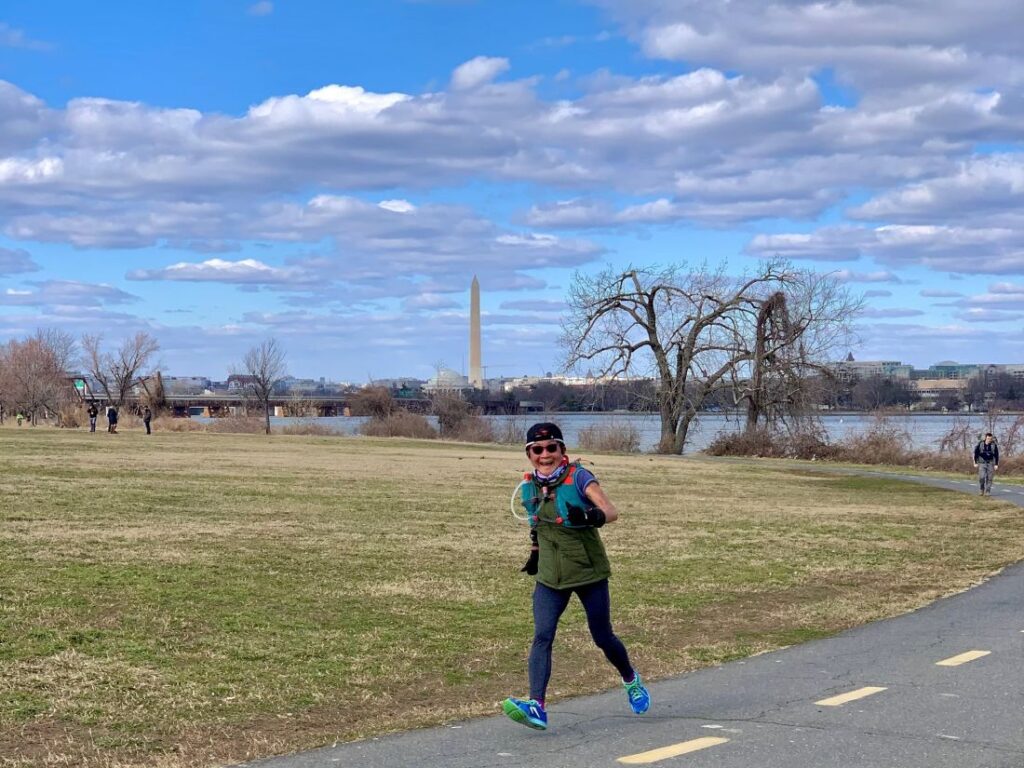
The 60s
Lien James, 69
I ran my first mile at age 49. I was walking with a group of female neighbors; one of them was telling me how great she felt when she ran the MCM and suggested that I should give it a try. She gave me the website of DC Fit, a marathon training group in my area. I thought about it but hesitated because I had never run in my life and was afraid I would not be able to finish it. But I was turning 50 around the time of the MCM that year so I figured why not try to do something I had never done before to celebrate my big day.
I signed up with DC Fit Marathon Training Group and was eager to start training. It was April of 2001, the registration for MCM was already closed and the only way to enter was through charity, so I signed up to run for Team Lombardi, a Cancer Research program at Georgetown Hospital. When I read a suggestion letter on how to fundraise, it emphasized that a marathon was 26.2 miles. That’s how I discovered how long a marathon actually is. With the commitment to raise $3,500 and to run 26.2 miles, I had no choice but to keep on training and fundraising. I had a lot of friends who believed in me and supported me, so I reached my fundraising goal of $3,500 within a month.
I crossed the MCM finish line on October 28, 2001 with the time of 5:06:07 at age 50. I was on top of the world!
During my six months of marathon training in 2001, I discovered how happy and fit I had become. I found lots of running friends and looked forward to every chance I could run; I enjoyed every mile. I thought I would just keep on running to keep fit and never thought of signing up for more marathons until February 2002, when a friend asked me to run 18 miles with her to help her get ready for a marathon that year. I flew through those 18 miles with her and went home to sign up for the marathon too. On March 3, 2002, I crossed the finish line of my second marathon in 4:56:30, almost 10 minutes faster than the MCM.
In 2008, after meeting Carol Goslin at mile 17 of another marathon, I started my quest to run a marathon in all 50 states by the time I turned 60. But I continued to make MCM my annual hometown marathon and in October 2013, it was my 100th marathon. I now have 131 marathons under my belt.
What does a #RunWithTheMarines mean to you?
I met my husband when he was a US soldier (not a Marine) in Vietnam. I don’t have any Marines in my immediate family, but since I have been running MCM for almost 20 years I have gotten to know many; they are my family.
I am a member of the Marine Corps Marathon & 10K Club, and I’m known as “Mama James” to most of the members. I very often post my happy and inspiring runs with beautiful pictures to share with them and give them many running tips. My main points of running are make it enjoyable, take the time to smell the roses and wear good fitting shoes and great running outfits. Run more and run happy.
Training advice for women in their 60s: Make running a joyful activity and never rush through it.
Since many of us are retired, be as flexible as you can when you are running so if you feel good and the weather is great, go for as long as you feel like it. Pick beautiful and safe running routes and alternate them often. Because of our age, asphalt is safer than trails so as to avoid tripping and falling. A Road ID attached to your running watch is a must and a Life 360 App on your phone will help you share your run with your loved ones so they can track where you run and find you when you are in trouble. Of course, you must have a phone with you when you run, and most importantly, avoid running after dark. Safety comes first.
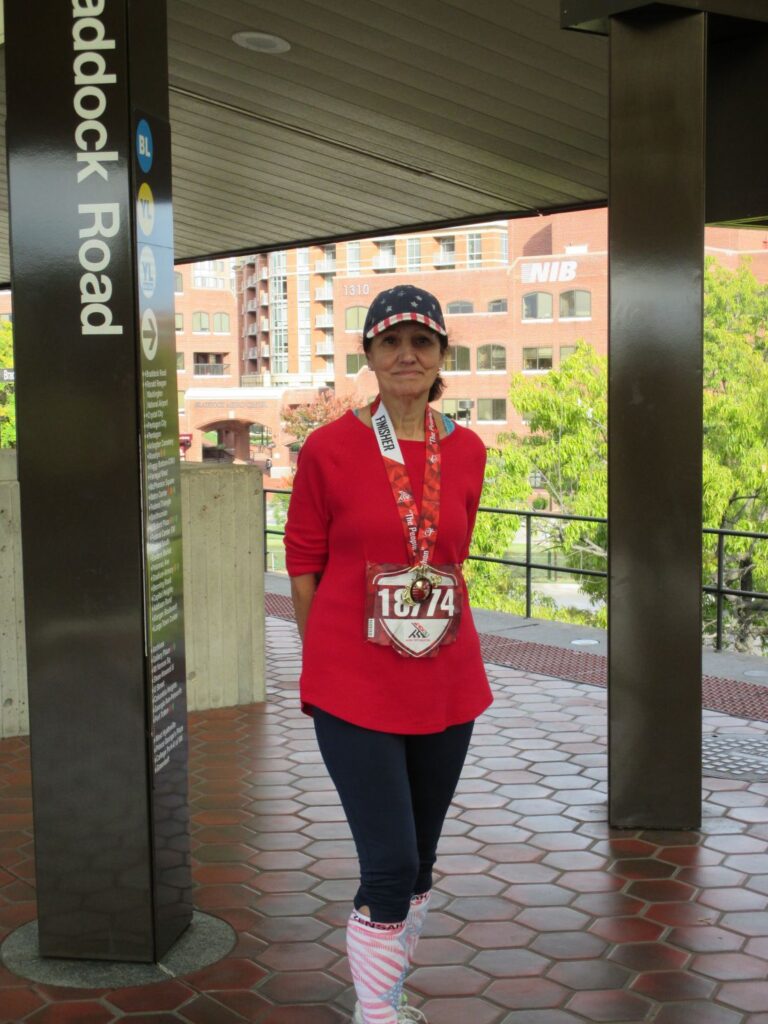
The 80s
Jacqueline Bardol, 80
I was born in France during World War II on November 16, 1940. When I was 32, I was assigned to the French Embassy in London as a Diplomatic Assistant. It was then I started learning how to play tennis and would ride my bicycle across Hyde Park from home to work. That was the extent of my athletic activities.
Then in the summer of 1987, I complained to a doctor friend in my building that I was feeling “old” and he recommended a healthy diet and frequent exercising. Coincidentally, the very next day another neighbor asked if I’d be willing to run with her and on our way to Hyde Park, we noticed a sign for a running club. We signed up that day and I completed my very first run; it was 20 minutes, but I felt like I was running for hours! A few months later at age 47, I ran my first marathon, finishing in 5:55:38.
By May 1993, I had moved to the French Embassy in Washington D.C. where a colleague started a running club and I was running during my lunch time now. Two years later, I ran my first MCM in 1995 with a finish time of 5:05:05. Since then, I have ran 21 MCMs including the virtual event in 2020 and two Marine Corps Historic Half marathons.
What does a #RunWithTheMarines mean to you?
I run with the Marines in memory of my grandfather who was a Navy Officer during WWI and also in memory of the American soldiers who lost their lives in France at Omaha Beach in Normandy.
I must mention that the most memorable MCM I ran was on October 2001 after 9/11 and I am proud to have had the honor to participate and finished it. I am looking forward to finishing my 22nd MCM and many more in the future.
Training advice for women in their 80s: It is important to listen to your body. Discipline yourself, but do not push your body to the extreme. I now walk a lot, jog, bike and do step-climbing at the gym. I also take Zumba classes and kickboxing lessons.
I believe that when you decide to finish a race mentally, you can do it, and when you finish, it is a great achievement – especially when you do it with Marines who bring so much motivation.
Written by Jheanel Walters, Public Relations Coordinator for the Marine Corps Marathon Organization.
Related Articles
The Gift You Give to Yourself – Running Your Way to Emotional Stability and Resilience This Holiday Season
Author: Alex Hetherington, MCMO Race Director The holiday season is often painted as a time of joy and connection, but for many, it also brings a unique mix of stressors: tight schedules, social obligations, financial pressures, and even the occasional family conflict. If you’re looking for a simple yet powerful way to maintain emotional stability […]
Heart like a wheel, mind like a wagon – A lifelong runner’s perspective on the daily search for meaning, value and experience.
Author: Alex Hetherington, MCM Race Director This phrase paints a vivid metaphor for the balance and persistence in a runner’s life. Let’s break it down and explore its implications: The interplay of these metaphors highlights the daily challenges of finding purpose and fulfillment, not only as a runner but as a person navigating the human […]
Thank you Marine Volunteers
Author: Robert Dietz, 2024 MCM Diplomat Let me preface this blog that I am grateful for all our volunteers that help out at the Marine Corps Events you all are awesome! Every volunteer has helped these events run smoothly and I am grateful. I felt like I had to do a special shout out and […]



